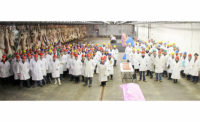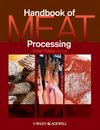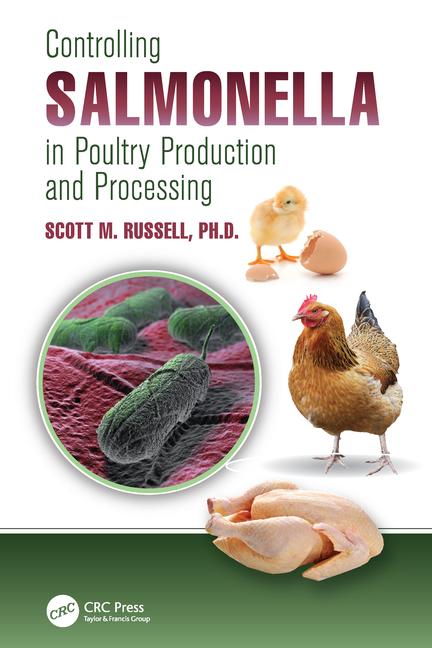UConn prepares students for diverse meat science careers
The Department of Animal Science offers two-year and four-year degree programs.

UConn’s meat science program in the Department of Animal Science (College of Agriculture, Health and Natural Resources) was officially established in 1956 by internationally recognized Dr. Donald Kinsman, a longtime American Meat Science Association member who dedicated his career to meat science research and teaching. Since then, the program has been preparing students to embark on diverse careers in the field, while faculty conduct groundbreaking research to help make meat safer, higher-quality, and more sustainable. The meat science curriculum at UConn covers multiple steps in the meat production process, from raising animals that will be healthy and produce high-quality meat, to assessing the quality and safety of the end product.
UConn Animal Science offers both a two-year program through the Ratcliffe Hicks School of Agriculture and a four-year degree baccalaureate program. The courses taken by students in this focus cover fundamental and cutting-edge information about animal nutrition, genetics, assessing meat safety and quality, as well as the meat industry in Connecticut and elsewhere in the country.
“Topics including animal harvesting, grading, inspection, processing, packaging, and curing are offered to students,” says Dr. Richard Mancini, associate professor. “The classes are designed to provide students with both practical and fundamental molecular principles associated with meat production.”
The program also emphasizes sustainable animal management, focusing on how to improve air, water, and soil quality while raising animals for food production.

“It’s that balancing of the rigor you need for an academic degree but also the industry awareness and career track,” says Dr. Joe Emenheiser, livestock extension educator. “And there’s a pretty good balance between the two.”
In Connecticut specifically, the meat industry is much smaller than in other areas of the country, such as the Midwest, which have much more land available for growing animals and more meat processing infrastructure. Especially in the wake of the COVID-19 pandemic, which caused significantly increased demand for local meats, Connecticut’s small meat industry is emerging with significant potential.
“It’s an opportunity for a land-grant institution to continue to plug in some science and undergraduate training to make sure it’s something sustainable, safe, and viable,” Dr. Emenheiser says.
One thing that makes UConn’s program unique is that it is the only university in the area that has cattle, sheep, pigs, and chickens on campus for students to study, providing them with hands-on learning opportunities within walking distance. Additionally, UConn is the only land-grant university in New England with an on-site meat laboratory. This laboratory is a small-scale version of the entire meat production process from harvest to inspection, processing, packaging, and curing. In the meat lab, students also learn about USDA grading guidelines.

UConn's graduate program is recognized nationally as well as internationally for its pioneering research in meat science and has a robust global footprint with alumni placed at prominent positions in industry and academia. Many meat industry leaders -- including Stephen Campano, Dr. Amy Alderton, and Gregory Dady -- and academic research faculty -- including Dr. Kumar Venkitanarayanan, Dr. Surendranath Suman, and Dr. Ranjith Ramanathan -- graduated from UConn’s animal science graduate program. These leading researchers committed their careers to support the meat industry and educating the next generation of meat scientists. UConn’s reach extends abroad as well, with graduate alumni including Dr. Qun Sun and Marilyn Garcia-Edrosolam developing outstanding careers in many other countries.
Since the program’s founding, UConn animal science faculty have conducted groundbreaking research to improve the quality and sustainability of meat industry.
“The studies in myoglobin chemistry directed by Dr. Cameron Faustman and Dr. Richard Mancini are landmarks in meat color research, and my lab will keep exploring meat chemistry responsible for fresh meat quality variation to help reduce food waste,” says Assistant Professor Chaoyu Zhai. “We also have a team of great researchers with expertise on other components in muscle food production.”
At UConn, Dr. Breno Fragomeni runs an animal genomics laboratory studying how genomic selection can improve traits related to meat production, like tolerance for heat stress and disease resistance. Dr. Sarah Reed’s lab focuses on the impact of poor maternal diet during gestation and its impact on fetal and postnatal muscle growth and development in sheep models. Dr. Mary Anne Amalaradjou’s lab studies sustainable food animal production, food safety, and gut health through the use of natural alternatives to antibiotics to improve poultry production, health, and meat safety. Dr. Abhinav Upadhyay’s lab focuses on reducing foodborne pathogens in meat using nanotechnology and Next-Gen sequencing. Dr. Kumar Venkitanarayanan’s lab explores the molecular mechanisms by which food-borne pathogens tolerate and survive adverse environmental stresses encountered in nature, foods, and in hosts.
In addition to teaching and research, UConn has a strong extension presence in New England communities. Dr. Emenheiser works with producers and processors in the livestock industry on supply chain development and meat quality improvement. Extension educator Dr. Indu Upadhyaya educates farmers on compliance guidelines from the FDA and FSMA (Food Safety Modernization Act), and administers workshops for meat and poultry processors throughout New England.
More information about the University of Connecticut’s Animal Science department and their programs can be found at: https://animalscience.cahnr.uconn.edu/.
Marianna Behrends, Ed.D. is project coordinator for the American Meat Science Association.
Looking for a reprint of this article?
From high-res PDFs to custom plaques, order your copy today!








